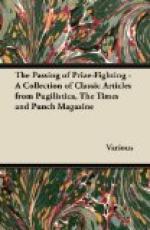Thursday.—E pur si muove; that is to say, it will move; they’ll all move, in spite of BRAMWELL. London, probably, the only population in the world that possesses the supernatural patience necessary to submit to having its movements obstructed by bars and gates put up across some of its principal thoroughfares. Oddly enough, they congregate round congeries of Railway Stations in the North. To-day, ROSEBERY in Lords moves Second Reading of Bill designed to have them swept away. BRAMWELL protests. “Speaking,” he said, “in name of over two hundred people who live in district affected by the Bill, I ask your Lordships to reject it.” This too much even for House of Lords. That alleged luxury of two hundred people should weigh against convenience of the population of London was a little monstrous. BRAMWELL kept his countenance admirably. LORD CHANCELLOR looked on admiringly.
“That’s the man for me, TOBY,” he said. “If we could only have a House of Lords all BRAMWELLS, with me on Woolsack, we’d make Old England once more a merry spot.”
Rest of House, however, would not enter into joke. MARKISS admitted that, being a constant passenger by Great Northern Railway, he generally “said a dam” when passing these gates. This felt to be a shocking state of things. Gates and bars must be bundled off, if only to prevent use of bad language by PRIME MINISTER. BRAMWELL reluctantly admitted this, still pleading with touching eloquence for preservation of the obstruction.
“My Lords,” he said, “think of what you’re doing to this great capital, of which we are all so justly proud. The Tower has become a disused place, and its historic hill no more reverberates to the merry chopping of the headsman’s axe. Temple Bar has gone, and long ago have vanished the heads that used to look wistfully down on the passing chairmen. The chairmen themselves have sped into eternity, and in their place circles the Hansom cab. No more does the lovely, lonely oil lamp swing at the corners of our streets. Your Lordships can wend your way homeward as far West as Kensington, or as far North as Highbury, without meeting the casual footpad. The town is drained; the river is embanked; our streets are paved; and we have a penny post. Almost all that is left to us of the good old times are these bars, arbitrarily set up across our thoroughfare, watched by a gentleman in a seedy suit, and a rain-beaten hat girt with tarnished golden lace. I beseech your Lordships, by your memories of infancy, by your love of our old Constitution, by the faith of your Order, by your fidelity to your Sovereign, to spare these last lingering relics of the London that helped to make our Empire great.”
[Illustration: “As if in Church.”]
House plainly touched at this outburst of eloquence. Lord BANGOR closed his eyes, and clasped his hands, as if in Church. If there can be any arrangement made in Committee by which the gates and bars, after removal, may be placed in convenient order round BRAMWELL’S residence, so that he shall be forced to make detours as he goes about his daily business, it shall be done. With this understanding, Amendment withdrawn, and Bill read Second Time.




